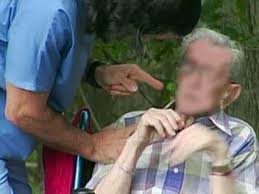As time passes, it can be challenging to watch our aging parents and grandparents for whom we love navigate life as they get older. As they age, it can be difficult to give them the additional  assistance they need when your life is full of responsibilities with your husband, wife and children. For that reason, people trust nursing homes to provide the care that they simply cannot. Unfortunately, not all elderly assisted living homes share the same standards as it relates to care. The sad reality is that some nursing homes have individuals who treat their patients poorly for a myriad of reasons.
assistance they need when your life is full of responsibilities with your husband, wife and children. For that reason, people trust nursing homes to provide the care that they simply cannot. Unfortunately, not all elderly assisted living homes share the same standards as it relates to care. The sad reality is that some nursing homes have individuals who treat their patients poorly for a myriad of reasons.
Signs To Be Aware Of In Your Elderly Loved One
Do you notice certain changes in your loved one? Do they seem scared or unusual? If so, they might be experiencing emotional abuse. There are certain signs you should look for if you believe your loved one is being treated poorly. Emotional abuse can include yelling, humiliation, or intimidation. This can all take a toll on anyone, but especially on elders. The following is a list of signs provided by The National Center On Elder Abuse for which to be on the look out:
Low Self-Esteem – Does your loved one seem more self-conscious than before? Do they not seem to think highly of themselves or accept praise, when they did before? These can all be signs that your loved one is not treated with kindness or respect.
Lack of Appetite – Lack of appetite is another sign that your loved one might be emotionally abused. When someone endures embarrassment and malicious actions, it can affect their desire for food and other joys.
Avoids Eye Contact – If a nursing home patient suffers constant intimidation or humiliation, they can internalize those sentiments. This can make it harder for them to make eye contact with other individuals. They may also avoid eye contact if they do not want to talk about the abuse.
Mood Swings – If your loved was generally congenial and pleasant, but now experiences mood swings, it might be a cause for concern. Talk to them to see if there is anything harming their emotional health.
Depression – Depression is a serious matter. If your loved one was happy and healthy before, but now seems dejected or detached, it can be cause for concern. If they also excessively sleep or avoid social interaction, it can be signs of depression, which can be caused by emotional abuse.
Fear – Does your loved one look like they are in a constant state of fear? It may be because they might be abused when you are not there.
Emotional abuse is a very serious offense, especially for those as fragile as the elderly. Nursing homes have an obligation to protect their patients. If you believe your loved one has suffered emotional abuse from the malicious care nursing home employees, you should contact an experienced personal injury lawyer. Call attorney Michael Pence and schedule a consultation.


